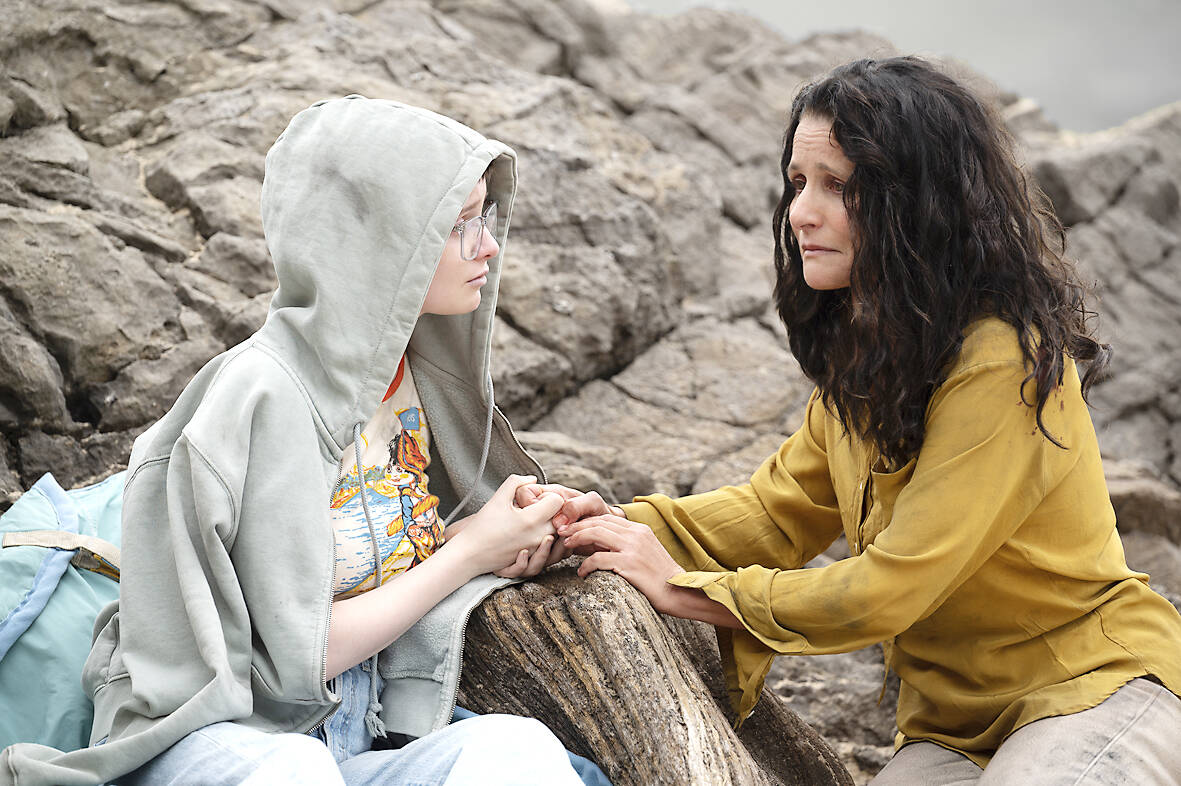Death has taken many forms in cinema. It’s been Bengt Ekerot. Ian McKellen. John Cleese. Even Brad Pitt with blonde highlights. But in Tuesday, filmmaker Daina O. Pusic’s bold, fantastical and affecting debut, death looks like a lot like a macaw that’s seen better days.
Covered in a thick layer of grime and oil with patches of feathers missing, Tuesday’s Death can be as big as a room or as small as an ear canal. Its booming, gravelly voice (that of actor Arinze Kene) sounds ancient and otherworldly. And it all adds up to something profoundly unsettling. Not exactly a comforting welcome into the afterlife, or whatever comes next.
Tuesday is about death and acceptance, between a mother and her dying daughter. But this is no Hallmark affair fitting for a sympathy card. It is prickly, wry, somewhat unsentimental, a bit gritty and awfully painful at times. Or maybe it’s just uniquely British. And you may just find yourself in a puddle of your own tears as a result.

Photo: AP
Now, in terms of cinematic emotional blackmail, a parent coming to terms with a child’s imminent death is pretty much in the red zone. That sort of setup could produce involuntary tears from an audience regardless of the level of talent involved. Thankfully for us, there is immense creativity and vision both in front of and behind the camera, including not just the writer-director but the special effects experts responsible for Death as well as the haunting and innovative sound design.
Lola Petticrew plays the titular Tuesday, a teen with a “Breathless” pixie cut, a love of jokes and rap music and a terminal illness that has bound her to an oxygen tank and the use of a wheelchair. Her mother, Zora ( Julia Louis-Dreyfus ), has entirely disconnected from the situation. She tiptoes around the house waiting for the nurse, Billie (a lovely Leah Harvey), to do the caretaking. She stays out all day, pawning household items for cash to pay for the care, ignoring Tuesday’s calls and occasionally falling asleep on park benches. At home, she doesn’t want to talk to Tuesday about anything real — the death, her job, their precarious financial position — it’s all been deeply repressed and compartmentalized and is making everyone crazy.
The day we meet Zora and Tuesday is the day Death arrives. Billie has left Tuesday on the patio for just a minute to start a bath. All of a sudden, the girl who was just joking around is having an episode, gasping for air, when the macaw lands by her side. Death is actually the first character introduced, in an unnerving series of deaths setting an ominous tone that will loom throughout. Some are ready to go, begging for relief. Some are just scared. And all have the same outcome once he’s put his wing around them.

Photo: AP
Tuesday, however, decides to tell a joke. This disarms Death (who bursts out laughing) and suddenly they’re in conversation together. She gives him a bath, puts on some music and asks a favor: She’d like to say goodbye to her mom first. Death obliges.
Of course the story both is and isn’t that simple. Tuesday becomes some strange combination of body horror, fairy tale, domestic drama and apocalypse thriller. It is weird and transfixing — never predictable and never boring. Louis-Dreyfus is both chilling and deeply empathetic as this woman who has been paralyzed by grief even before it’s happened. She seems to be preparing for her own death in a way, unable and unwilling to process a life without her daughter who, at this point, doesn’t even realize that her mother still loves her. Petticrew holds her own, going head-to-head with Louis-Dreyfus at her cruelest, exhibiting a wisdom beyond her years and fitting of a person who’s had to grow up and face death far too early.
Tuesday is ultimately a cathartic affair, whether death is top of mind at the moment or not. And it announces the arrival of a daring filmmaker worth following.

There is a Chinese Communist Party (CCP) plot to put millions at the mercy of the CCP using just released AI technology. This isn’t being overly dramatic. The speed at which AI is improving is exponential as AI improves itself, and we are unprepared for this because we have never experienced anything like this before. For example, a few months ago music videos made on home computers began appearing with AI-generated people and scenes in them that were pretty impressive, but the people would sprout extra arms and fingers, food would inexplicably fly off plates into mouths and text on

On the final approach to Lanshan Workstation (嵐山工作站), logging trains crossed one last gully over a dramatic double bridge, taking the left line to enter the locomotive shed or the right line to continue straight through, heading deeper into the Central Mountains. Today, hikers have to scramble down a steep slope into this gully and pass underneath the rails, still hanging eerily in the air even after the bridge’s supports collapsed long ago. It is the final — but not the most dangerous — challenge of a tough two-day hike in. Back when logging was still underway, it was a quick,

From censoring “poisonous books” to banning “poisonous languages,” the Chinese Nationalist Party (KMT) tried hard to stamp out anything that might conflict with its agenda during its almost 40 years of martial law. To mark 228 Peace Memorial Day, which commemorates the anti-government uprising in 1947, which was violently suppressed, I visited two exhibitions detailing censorship in Taiwan: “Silenced Pages” (禁書時代) at the National 228 Memorial Museum and “Mandarin Monopoly?!” (請說國語) at the National Human Rights Museum. In both cases, the authorities framed their targets as “evils that would threaten social mores, national stability and their anti-communist cause, justifying their actions

In the run-up to World War II, Admiral Wilhelm Canaris, head of Abwehr, Nazi Germany’s military intelligence service, began to fear that Hitler would launch a war Germany could not win. Deeply disappointed by the sell-out of the Munich Agreement in 1938, Canaris conducted several clandestine operations that were aimed at getting the UK to wake up, invest in defense and actively support the nations Hitler planned to invade. For example, the “Dutch war scare” of January 1939 saw fake intelligence leaked to the British that suggested that Germany was planning to invade the Netherlands in February and acquire airfields